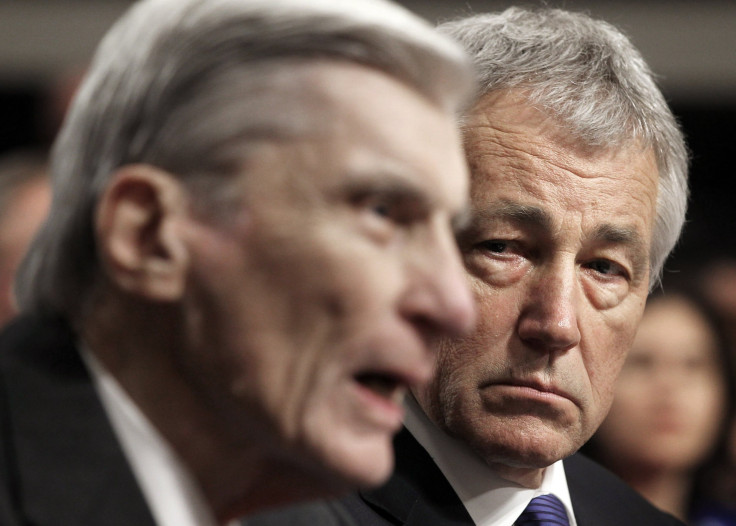Chuck Hagel's Legacy: From Vietnam War Hero To Pentagon Chief

President Barack Obama announced Monday morning that Chuck Hagel is resigning as defense secretary less than two years after he assumed the post. The 68-year-old statesman has long been a major figure in American politics, but the White House has signaled that it wants to take a different direction at the Pentagon as it battles rising tensions across the Middle East, Europe and Africa.
Hagel’s legacy as one of the Republicans most willing to bridge Washington's partisan divide over the past decade remains intact. He also has been praised by leaders from both parties for taking a thoughtful approach to foreign policy. A friend of Obama’s from their days on the Senate Foreign Relations Committee, he bonded with the Democrat over their criticism of the Iraq War, the New York Times reported.
But that relationship appears to have soured somewhat in recent months. The Obama administration reportedly wanted him to be more vocal in his support of its policies, while Hagel felt that he was being micromanaged, CBS News reported. Sen. John McCain, R-Ariz., said on an Arizona radio show Monday that Hagel “was very, very frustrated” with his interactions with the White House, the Hill reported.
Obama offered effusive praise of Hagel during the a press conference announcing his departure Monday. "When it mattered most behind closed doors, in the Oval Office, you’ve always given it to me straight. For that, I will always be grateful," Obama said, calling Hagel “a great friend of mine” and “an exemplary defense secretary.”
The Nebraska native has been involved in the military since the Vietnam War, during which he earned two Purple Hearts as an Army infantryman. In the years since, he has built a career in public life that took him all the way to Obama’s Cabinet, of which he was the only remaining Republican member.
Hagel has gone back and forth through Washington’s revolving door, becoming a fixture on Capitol Hill during the 1970s, and working as a lobbyist, congressional staffer, campaign staffer for Ronald Reagan and then deputy administrator of Reagan’s Veterans Administration. From the early 1980s to 1996, however, he turned to business, making millions off the mobile telephone company he co-founded, Vanguard Cellular, working in investment banking, and more.
Though he rebuffed previous entreaties to get into politics, Hagel finally ran in 1996 for a Nebraska U.S. Senate seat, which he won and held for two terms. In the Senate, Hagel was a reliable conservative who voted for many of President George W. Bush’s signature programs, including the No Child Left Behind education policy. He also threw himself into foreign affairs, initially supporting the 2002 authorization to launch the Iraq War, but later criticizing the conflict and becoming one of the right’s leading voices for withdrawal.
That antiwar stand, combined with Hagel’s character and the bond he had with Obama, helped Hagel earn the respect of the president. In 2008, he retired from the Senate, making good on a vow he made in 1996 to step down after two terms. Long touted as a candidate for the Cabinet or even the vice presidency, he went on to serve as a professor at Georgetown University, advise the Obama administration on intelligence, chair the Atlantic Council, and serve in various capacities for the next several years.
Then, in 2013, he was tapped to become Obama’s third defense secretary, following Robert Gates and Leon Panetta. He occupied the role through a period that saw the rise of the Islamic State terror group, rising tensions with Russia’s Vladimir Putin, the continuing fallout of the Arab Spring in the Middle East and the first months of the Ebola outbreak in West Africa. He presided over a tumultuous period marked by the drawdown of troops in Afghanistan, the deployment of troops to fight Ebola in Liberia and airstrikes against the Islamic State.
After discussing Hagel’s options with him in recent weeks, Obama reportedly decided that he needed to find a new defense chief as the country finds itself increasingly embroiled in the effort to dismantle Islamic State militants, among other pressing foreign policy challenges.
"It’s been the greatest privilege of my life — the greatest privilege of my life to lead and, most important, to serve — to serve with the men and women of the Defense Department and support their families," Hagel said after Obama announced his resignation Monday. "I am immensely proud of what we’ve accomplished during this time."
© Copyright IBTimes 2024. All rights reserved.











